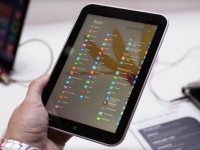
Intel disclosed a lineup of revamped Atom chips Wednesday that target both Windows 8.1 and Android tablets.
The Z3000 series is based on a redesigned Atom processor that promises better performance than the pokey chips that powered Windows 7 Netbooks of the past.
Performance is boosted by employing so-called "out-of-order execution," similar to what Intel uses in its higher-performance mainstream laptop processors. It also packs improved graphics silicon that is essentially the same "HD" technology used in Intel's laptop-class Ivy Bridge processors, said Chris Walker, general manager for tablet processors at Intel, in an interview.
Intel will need everything in its formidable arsenal of technology to battle ARM chip giants Apple, Qualcomm and Samsung, which dominate the tablet market today.

"This is the first major revamp of the Atom architecture in five years. We're able to bring our leading-edge 22-nanometer technology. So those [3D] transistors provide the foundation for [increased performance] and the HD graphics," said Walker.
All of this adds up to a twofold to threefold performance boost over the current "Clover Trail" Atom, Walker said.
Other improvements include faster memory. Memory (64-bit interface) speeds range up to 17 gigabytes per second (see chart at bottom), vastly improved over the current generation of Clover Trail chips, according to Walker.
At the top of the Bay Trail lineup is the Z3370,which runs at frequencies of up to 2.4GHz and supports faster memory (dual-channel LPDDR3 1067 for those keeping track) at capacities of up to 4GB.
Device makers including Acer, Asus, Dell, Lenovo, and Toshiba are expected to announce tablets and/or hybrids (what Intel calls a 2-in-1), Intel said.

